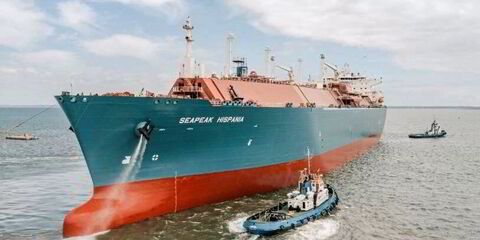It’s a rare occasion in shipping merger-and-acquisition deals that such a complete picture of the behind-the-scenes competition for a company emerges as it did this week with Grindrod Shipping Holdings.
Of course, we already knew before the filing of highly detailed proxy materials with securities regulators that the “winner” of the fray was UK-listed Taylor Maritime Investments (TMI), which is closing out a $26-per-share cash tender for Grindrod.
But it was only after the massive documents dump — and a little sleuthing with market sources — that TradeWinds was able to declare “losers” of the pursuit: TMI’s larger US-listed peers Eagle Bulk Shipping and Genco Shipping & Trading.

Both US companies seemed to lose conviction in the hunt as the dry bulk market began to deteriorate around them over the summer, causing them to reduce or decline to improve best offers. Meanwhile, Ed Buttery-led TMI stayed the course and eventually prevailed.
But on further reflection, do we really know the winners and losers in this game?
The argument can be made that executive teams at Eagle and Genco got cold feet over a major acquisition for the right reasons. And by the same token, that TMI is playing a risky game levering up its balance sheet to carry out the deal in a declining dry bulk market.
Will Eagle and Genco executives sleep better at night on the notion that sometimes your best deal is the one you haven’t done?
Ultimately, the dry bulk market, with all its uncertainty over near and medium-term prospects, will be the decider on this one.
To be sure, it is easy to see the appeal of the takeover from the viewpoint of TMI, which is vaulting up the list of public dry bulk owners with the presumed successful completion of the tender.
TMI stands to more than double its fleet of 26 handysize bulkers with the acquisition of Grindrod’s core fleet of 15 handysizes and 16 supramax/ultramax vessels.
It benefits in financial scale as well, as it is the smaller company in current market capitalisation: near $380m this week compared with Grindrod’s $494m.
A rare chance
It’s a combination that at minimum catapults TMI into the same ranks as the Gencos and Eagles of the sector as a major public player.
What’s more, the chance to swallow a company of Grindrod’s size is rare.
“The opportunity for this sort of deal doesn’t come along very often. That’s what makes it hard to walk away from,” one dry bulk executive told Streetwise.
But with the excitement comes concern over a call on a dry bulk market that is increasingly difficult to read.

“This is a big bet on the future of handysizes,” said one executive. “The upside scenario is that the handysize market continues to do well and justifies the prices that were paid.
“The downside scenario is that it doesn’t continue to do well and does not justify those prices, at least within the context of Taylor’s balance sheet, which they are levering up considerably to do the deal.”
A projected scant increase in bulker supply over the next few years provides some comfort, but only to an extent.
“The dry bulk market is incredibly confusing right now,” the executive said. “For example, 40% to 50% of dry bulk cargoes end up in China. How’s the Chinese economy doing, and how do you know?
“Nobody has a clue how it’s doing now and they have even less of a clue how it will do in the future. It would be nice to know the demand side.”
Even documents filed in support of the TMI-Grindrod combination raise questions about future market strength.
Who shrank the Ebitda?
A chart prepared by US investment bank Evercore, financial advisor to TMI, show Grindrod’s estimated 2022 Ebitda of $224.6m nearly halving to $116.4m next year, then diving to $89.8m in 2024 and $25.2m by 2026.
One of the few analysts to cover Grindrod is Poe Fratt of Alliance Global Partners. At the announcement of the deal in August, he held out hope for a sweetened offer.
He now tells Streetwise that he believes the $26 offer is reasonable.
“I think it’s fair, especially in the context of the weakening market. Rates, valuations and public share prices in dry bulk all have declined since August,” Fratt said.
Evercore projects the deal is being concluded at 89% of its estimated Grindrod net asset value (NAV) of $27.32.
A discount to Grindrod’s NAV always was assumed in the tender process. Although a shares-based offer by Genco had an implied value of $30.33 and cash offers of $28 came from Eagle and TMI, these were when Grindrod’s NAV was estimated at $31 to $32 per share.
Offers weakened as the market did. But did TMI get Grindrod cheap? The market will tell us in a couple of years.
More ship finance news
Norwegian shipowner PGS took less than a day to complete a $150m private share sale to boost refinancing efforts. The Oslo-listed seismic survey player said it had sold the maximum amount of stock in the offering. Click here to read.
Scorpio Tankers president Robert Bugbee was in a good mood on Tuesday after reporting record-setting results for the third quarter, and it turns out he had a little fun with the equity analysts assembled for his earnings call. Click here to read.
The split between shipping fund manager Joakim Hannisdahl and Cleaves Securities may end up in a Norwegian court. Click here to read.(Copyright)




